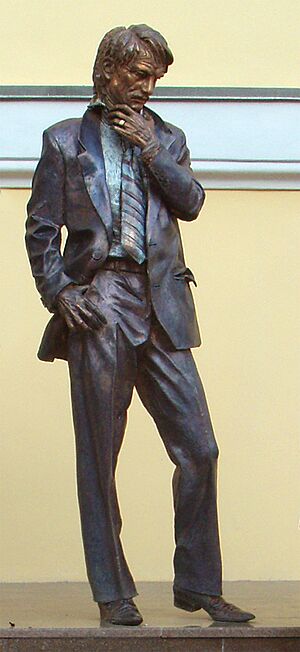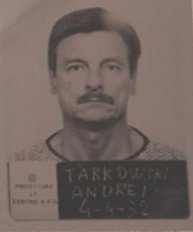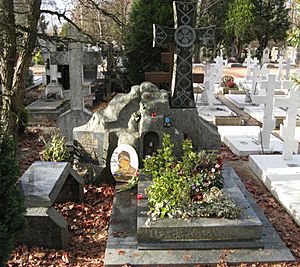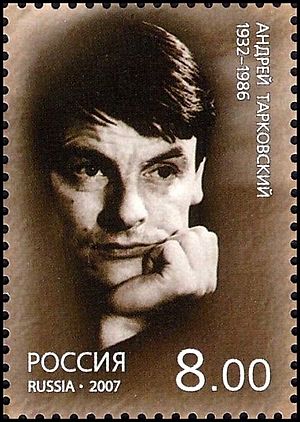Andrei Tarkovsky facts for kids
Quick facts for kids
Andrei Tarkovsky
|
|
|---|---|
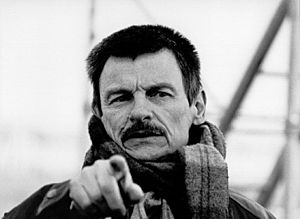 |
|
| Born |
Andrei Arsenyevich Tarkovsky
4 April 1932 Zavrazhye, Ivanovo Oblast, Russian SFSR, Soviet Union (now Kadyysky District, Kostroma Oblast, Russia)
|
| Died | 29 December 1986 (aged 54) Paris, France
|
| Resting place | Sainte-Geneviève-des-Bois Russian Cemetery, Paris |
| Alma mater | Gerasimov Institute of Cinematography |
| Occupation | Filmmaker |
| Years active | 1958–1986 |
| Spouse(s) | |
| Parent(s) |
|
| Awards |
|
Andrei Arsenyevich Tarkovsky (Russian: Андрей Арсеньевич Тарковский; 4 April 1932 – 29 December 1986) was a famous Russian filmmaker. Many people think he was one of the greatest and most important directors in movie history. His films often explored deep ideas about life, and they are known for being slow-paced with long scenes. They also featured dreamlike pictures and often showed nature and memories.
Tarkovsky learned about filmmaking at Moscow's VGIK. He then directed his first five movies in the Soviet Union. These were Ivan's Childhood (1962), Andrei Rublev (1966), Solaris (1972), Mirror (1975), and Stalker (1979). Some of these films are considered among the best movies ever made.
After facing challenges with film officials for many years, Tarkovsky left the country in 1979. He made his last two films abroad: Nostalghia (1983) was made in Italy, and The Sacrifice (1986) was made in Sweden. In 1986, he also wrote a book about movies and art called Sculpting in Time. He passed away later that year from cancer.
Tarkovsky received many awards at the Cannes Film Festival during his career. These included the FIPRESCI prize and the Prize of the Ecumenical Jury. He also won the Golden Lion award at the Venice Film Festival for his first film, Ivan's Childhood. In 1990, he was given the important Lenin Prize in the Soviet Union after his death. Three of his films—Andrei Rublev, Mirror, and Stalker—were listed among the 100 greatest films of all time in a 2012 poll by Sight & Sound.
Contents
Andrei Tarkovsky's Life and Career
Growing Up and Early Years
Andrei Tarkovsky was born in a village called Zavrazhye in Russia. His father, Arseny Tarkovsky, was a poet, and his mother, Maria Ivanova Vishnyakova, worked as a proofreader.
Andrei spent his childhood in Yuryevets. He was known as an active and popular kid with many friends. His father left the family in 1937 and later joined the army. Andrei lived with his mother and sister, Marina, in Moscow.
In 1939, Tarkovsky started school in Moscow. During the war, his family moved away for a while but returned to Moscow in 1943. He continued his studies and also learned piano and attended art classes. Many parts of his childhood, like moving during the war and his family life, appeared in his film Mirror.
After school, from 1951 to 1952, Tarkovsky studied Arabic. He later left his studies to work as a prospector, looking for metals and gold. He spent a year on a research trip in a wild forest area called the taiga. It was during this time that Tarkovsky decided he wanted to study film.
Becoming a Film Student
After his research trip, Tarkovsky applied to the State Institute of Cinematography (VGIK) in 1954 and was accepted into the film-directing program. He met and married Irma Raush in 1957.
This was a good time for young film directors in the Soviet Union. The country was becoming a bit more open, allowing Tarkovsky to see films from other countries. He was able to watch movies by famous directors like Akira Kurosawa, Ingmar Bergman, and Luis Buñuel.
Tarkovsky's teacher, Mikhail Romm, was a big influence. Romm gave his students a lot of freedom. In 1956, Tarkovsky directed his first short student film, The Killers. He also made a longer TV film, There Will Be No Leave Today, in 1959.
During his third year at VGIK, Tarkovsky met Andrei Konchalovsky. They became good friends and shared many ideas about movies. In 1959, they wrote a script called Antarctica – Distant Country. They also wrote The Steamroller and the Violin, which became Tarkovsky's graduation project. This film won an award at the New York Student Film Festival in 1961.
Making Films in the Soviet Union
Tarkovsky's first major film was Ivan's Childhood in 1962. This film brought him international fame and won the Golden Lion award at the Venice Film Festival. In the same year, his first son, Arseny, was born.
In 1965, he directed Andrei Rublev, a film about a famous Russian icon painter from the 15th century. This film faced problems with Soviet officials and was not released right away. Tarkovsky had to make several changes to it. Even so, it was shown at the Cannes Film Festival in 1969 and won an award.
He divorced his first wife, Irina, in 1970. Later that year, he married Larisa Kizilova, who had worked on his film Andrei Rublev. Their son, Andrei Andreyevich Tarkovsky, was born that same year.
In 1972, he finished Solaris, a science fiction film based on a novel. It was shown at the Cannes Film Festival and won a special jury prize.
From 1973 to 1974, he filmed Mirror. This was a very personal film that used parts of his own childhood and poems by his father. It showed the challenges of growing up during wartime. Soviet officials did not like this film much because they found it too complex. This made Tarkovsky think about making films outside the Soviet Union.
In 1976, he directed Hamlet, his only stage play, in Moscow. The main actor was Anatoly Solonitsyn, who also appeared in many of Tarkovsky's films.
The last film Tarkovsky made in the Soviet Union was Stalker, which was inspired by a novel. This film had many difficulties during its making, including technical problems and delays. It was finished in 1979 and won an award at the Cannes Film Festival.
Working Outside Russia
In 1979, Tarkovsky traveled to Italy and made a documentary called Voyage in Time. He returned to Italy in 1980 and worked on the script for his next film, Nostalghia.
Tarkovsky started filming Nostalghia in Italy in 1982. The film was completed in 1983 and was shown at the Cannes Film Festival. It won several awards. Soviet officials tried to stop the film from winning the top prize, which made Tarkovsky even more determined to work outside the Soviet Union. After Cannes, he went to London to direct an opera called Boris Godunov.
In 1984, Tarkovsky announced in Milan that he would not return to the Soviet Union and would stay in Western Europe. He said he had no conflict with the Soviet government but would be "unemployed" if he went back. His son, Andriosha, was still in the Soviet Union at that time and was not allowed to leave.
Tarkovsky spent most of 1984 preparing his final film, The Sacrifice. It was filmed in Sweden in 1985. Many of the people working on the film had also worked with director Ingmar Bergman, including the cinematographer Sven Nykvist.
The Sacrifice is about the end of the world and ideas of faith. Sadly, at the end of 1985, Tarkovsky was diagnosed with lung cancer. In January 1986, he began treatment in Paris, and his son, Andre Jr., was finally allowed to join him. Tarkovsky dedicated his last film to his son.
The Sacrifice was shown at the Cannes Film Festival and received several awards. Because Tarkovsky was too ill to attend, his son collected the prizes for him.
His Passing
Andrei Tarkovsky passed away in Paris on 29 December 1986. He was buried in the Sainte-Geneviève-des-Bois Russian Cemetery in France. The words on his gravestone, put up in 1994, say: To the man who saw the Angel. His wife, Larisa, passed away in 1998 and is buried next to him.
Andrei Tarkovsky's Film Style
Tarkovsky believed that all art, especially movies, should be emotional and touch the heart. His films are known for their deep themes, very long scenes, and beautiful images. He often used recurring ideas like dreams, memories, childhood, running water with fire, rain indoors, reflections, and characters appearing in the foreground of long camera movements. He once said that cinema's purpose is to show how a person relates to the whole world.
Tarkovsky often included scenes where things seemed to float, especially in Solaris. He used these scenes for their magical and beautiful look. Water, clouds, and reflections were also used for their beauty and what they symbolized. Bells and candles were common symbols too, representing sight and sound, and his films often explored ideas of self-reflection.
Tarkovsky had a special idea about cinema he called "sculpting in time." He meant that movies could change how we experience time. By using long scenes and few cuts, he wanted viewers to feel time passing and how different moments connect.
He also sometimes used both color and black-and-white scenes in his films. For example, Andrei Rublev was mostly black-and-white but ended with a color section showing Rublev's paintings. He felt that color should be used carefully to highlight special moments, not all the time, so it wouldn't distract the viewer.
Important Collaborators
Tarkovsky worked closely with cinematographer Vadim Yusov from 1958 to 1972. Much of the unique visual style in Tarkovsky's early films came from this teamwork. Tarkovsky would spend a lot of time preparing for Yusov to film a single long scene, and usually, only one take was needed because of this careful planning.
For his last film, The Sacrifice, Tarkovsky worked with cinematographer Sven Nykvist. Nykvist had worked on many films with director Ingmar Bergman. Nykvist said that working with Tarkovsky was one of the best choices he ever made.
Andrei Tarkovsky's Films
Tarkovsky is mostly known as a film director. During his career, he directed seven main movies, plus three short films from his time at film school. His main films are:
- Ivan's Childhood (1962)
- Andrei Rublev (1966)
- Solaris (1972)
- Mirror (1975)
- Stalker (1979)
- Nostalghia (1983)
- The Sacrifice (1986)
He also wrote several screenplays (the stories for films). Besides films, he directed the play Hamlet in Moscow and the opera Boris Godunov in London. He also wrote Sculpting in Time, a book about film ideas.
Tarkovsky was always involved in writing the screenplays for his films, sometimes with another writer. He believed that a director who just filmed someone else's story without being involved in writing it would make dull movies.
Films about Tarkovsky
- Voyage in Time (1983): This film shows Andrei Tarkovsky's travels in Italy as he prepared to make his film Nostalghia.
- Tarkovsky: A Poet in the Cinema (1984): Directed by Donatella Baglivo.
- Moscow Elegy (1987): A documentary about Tarkovsky by Alexander Sokurov.
- One Day in the Life of Andrei Arsenevich (1999): A French documentary film by Chris Marker.
- Tarkovsky: Time Within Time (2015): A documentary by P. J. Letofsky.
- Andrei Tarkovsky: A Cinema Prayer (2019): A documentary by Tarkovsky's son, Andrei A. Tarkovsky.
Awards and Legacy
Andrei Tarkovsky received many awards during his life.
- At the Venice Film Festival, he won the Golden Lion for Ivan's Childhood.
- At the Cannes Film Festival, he won the FIPRESCI prize three times and the Prize of the Ecumenical Jury three times. He also won the Grand Prix Spécial du Jury twice and the Best Director award once. He was also nominated for the top prize, the Palme d'Or, three times.
- In 1987, he won the BAFTA Award for Best Foreign Language Film for The Sacrifice.
After his death, Tarkovsky was finally recognized in the Soviet Union. In 1990, he was given the Lenin Prize, one of the highest honors in the Soviet Union. The Andrei Tarkovsky Memorial Prize was created in 1989.
In 1996, the Andrei Tarkovsky Museum opened in Yuryevets, his childhood town. A small planet, 3345 Tarkovskij, discovered in 1982, was named after him.
There is a monument at the entrance to the Gerasimov Institute of Cinematography in Moscow that includes statues of Tarkovsky and other filmmakers.
See Also
 In Spanish: Andréi Tarkovski para niños
In Spanish: Andréi Tarkovski para niños
- European art cinema
- Slow cinema
- Moscow International Film Festival
 | Jewel Prestage |
 | Ella Baker |
 | Fannie Lou Hamer |


